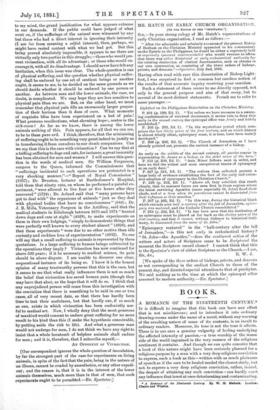MR. HATCH ON EARLY CHURCH ORGANISATION. [to ms EDITOR OF
TIM"SPECTATOR."] SIR,—In your strong eulogy of Mr. Hatch's representations of early Christian organisation, I read as follows :— "After the admirable and scholarly excursus of the present Bishop of Durham on the Christian Ministry appended to his commentary on the Epistle to the Philippians, he would be either a supremely bold or supremely ignorant controversialist who would venture to affirm that there was either Scriptural or early ecclesiastical authority for the existing distinction of clerical functionaries, such as obtains in our own communion, as consisting of the three orders of bishops, priests, and deacons."—Spectutor, July 2nd, 1881.
Having often read with care this dissertation of Bishop Light- foot, I was surprised to find a common but careless notion of the results of that accurate inquiry receiving your sanction.
Such a statement of them seems to me directly opposed, not only to the general purpose and aim of that essay, but to several of its most distinct statements. Permit me to refer to some passages :—
Lightfoot on the Philippians Dissertation on the Christian Ministry.
P. 201 (p. 199, Ed. 1). "Yet unless we have recourse to a sweep- ing condemnation of received documents, it seems vain to deny that early in the second century the episcopal office was firmly and widely established."
P. 205 (p. 203, Ed. 1). "In the mysterious period which com- prises the last thirty years of the first century, and on which history is almost wholly silent, episcopacy must, it is true, have been mainly developed."
P. 208 (p. 206, Ed. 1). "The Church of Jerusalem, as I have already pointed out, presents the earliest instance of a bishop.
• As early as the middle of the second century, all parties concur in representing St. James as a bishop, in the strict sense of the term."
P. 212 (p. 209, Ed. 1). "Asia Minor follows next in order, and here we find the widest and most unequivocal traces of episcopacy at an early date."
P. 227 (p. 224, Ed. 1). "The notices thus collected present a large body of evidence establishing the fact of the early and exten- sive adoption of episcopacy in the Christian Church."
P. 228 (p. 225, Ed. 1). "Above all, they establish this result clearly, that its maturer forms are seen first in those regions where the latest surviving Apostles (more especially St. John) fixed their abode, and at a time when its prevalence cannot be dissociated from their influence or their sanction."
P. 207 (p. 205, Ed. 1). "In this way, during the historical blank which extends over half a century after the fall of Jerusalem, episco- pacy was matured, and the Catholic Church consolidated."
P. 234 (p. 232, Ed. 1). "It has been seen that the institution of an episcopate must be placed as far back as the closing years of the first century, and that it cannot, without violence to historical testi- mony, be dissevered from. the name of St. John."
"Episcopacy matured" in the "half-century after the fall of Jerusalem,"—is this not early in ecclesiastical history ? "St. John—the Apostles,"—does the continued action of the writers and actors of Scripture cease to be Scriptural the moment the Scripture record closes? I cannot think that this is the Spectator's view of either Scripture or the Church.—I am, [We spoke of the three orders of bishops, priests, and deacons as not corresponding in the earliest Church to those of the present day, and directed especial attention to that of presbyter. We said nothing as to the time at which the episcopal office assumed its modern authority.—En. Spectator.]


































 Previous page
Previous page